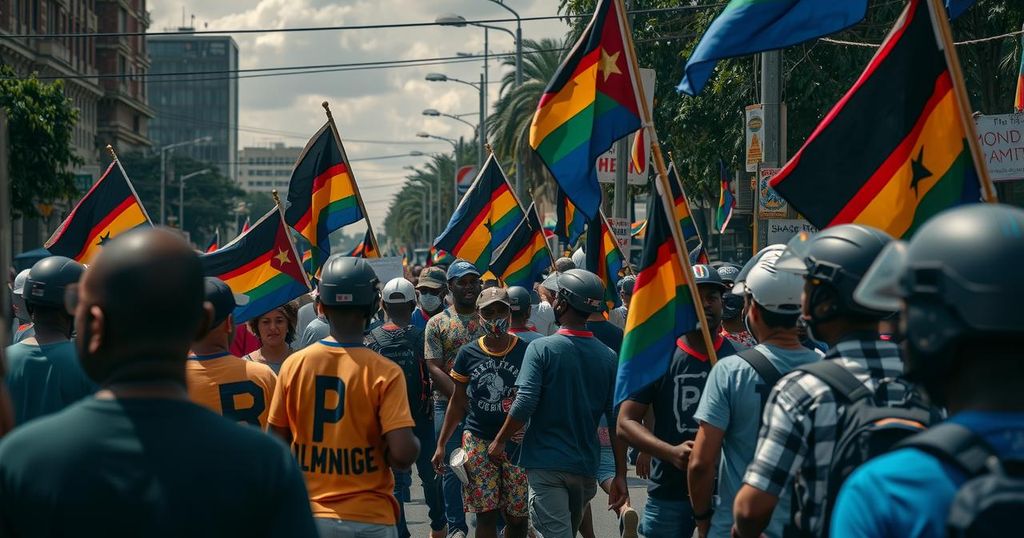Ongoing Protests in Mozambique Highlight Discontent and Demand for Change
Following a disputed election in Mozambique, citizens have engaged in persistent protests, marked by coordinated pot-banging demonstrations. With rising death tolls and violent police confrontations, the unrest reveals widespread discontent with the government, fueled by claims of electoral fraud and socio-economic grievances. The protests threaten trade relations and underline profound systemic issues that extend beyond the election results.
On the evening of November 4, 2023, the streets of Maputo, Mozambique, fell silent as opposition leader Venancio Mondlane called for widespread shutdowns following the controversial elections of October 9. Amidst the turmoil, residents began a series of coordinated pot-banging protests, known as “panelaco,” allowing citizens to express their dissent while minimizing direct confrontation with authorities. These protests emerged in response to the ruling Frelimo party’s announcement that Daniel Chapo received 71% of the vote, a claim contested vehemently by Mondlane, who declared himself the legitimate victor. The protests escalated, leading to public demonstrations and calls for economic stoppages that resulted in at least 30 fatalities due to violent confrontations with police. The unrest significantly disrupted trade at key borders, while fear among citizens grew as police repression intensified. Protestors expressed their frustrations by asserting that the elections were marred by fraud and systemic irregularities. Student Henrique Amilcar Calioio emphasized the symbolic impact of the pot-clanging tradition as a voice of the oppressed, highlighting the unity it fostered. Despite significant socio-economic grievances fueling the protests, the reaction from the government has been severe. Police have classified the protests as “urban terrorism,” while security forces’ use of tear gas and live ammunition only galvanizes public anger further. The repercussions of these protests are tangible, with significant economic losses reported, impacting both local economies and trade relations, particularly with South Africa.
The political climate in Mozambique has been tumultuous since the recent elections that many citizens consider illegitimate. Mondlane’s challenges to the election results, coupled with the assassination of his attorney, heightened public discontent. The “panelaco” protests symbolize a grass-roots movement against perceived electoral fraud and the ruling elite, as citizens engage in collective action despite the risks of police retaliation. Additionally, broader economic frustrations, coupled with the recent protests’ severe impact on trade and stability, indicate societal discontent that transcends the election cycle.
The ongoing protests in Mozambique reflect profound dissatisfaction with both the electoral process and the broader socio-economic conditions faced by its citizens. With civilian unrest continuing to escalate amid a heavy-handed police response, the repercussions are severe, leading to significant economic impacts domestically and regionally. As the protests evolve, they indicate a deeper yearning for change and improved governance, challenging the status quo in Mozambique.
Original Source: www.aljazeera.com




Post Comment